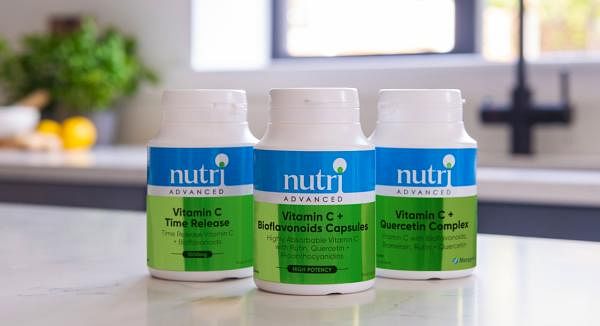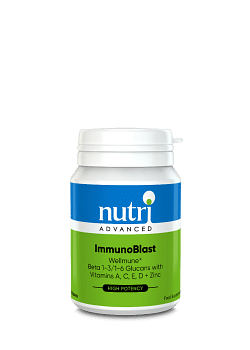Immune Health - Dietary, Lifestyle & Supplement Do's
Why you can trust Nutri Advanced Every article on our site is researched thoroughly by our team of highly qualified nutritionists. Find out more about our editorial process.
Immune Health
Your immune system is incredibly complex, intelligent and effective at protecting you against foreign invaders such as bacteria and viruses. If you could see what’s happening inside your body when faced with any such invader, you would literally stand back in awe to marvel at your body’s natural capabilities. You are not defenceless, even against new types of bacteria and viruses; in fact, your immune system has vast amounts of resources and strategies to provide a comprehensive defence.
Just like any other bodily system however, your immune system needs support to be able to function at its optimal best. A bit like making sure the conditions are right when you plant a seed, you can nurture the right environment for your immune system to thrive too. And paying close attention to what your immune system needs is the most useful action you can take to help your body do its job properly.
The good news is that whilst the immune system itself is complex, it doesn’t require complicated support. The steps you can take are relatively simple. And you don’t need to do everything at once, just choose one thing and be reassured that anything you do will make a positive difference.
Dietary Do’s & Do’s
✔ Eat a RAINBOW of brightly coloured vegetables and fruits every day
Aim for 10 servings daily and 40 different types each week. Don’t worry if you are way off this currently, as most people are! Start with one extra portion daily and increase gradually each week. Brightly coloured fruits & vegetables contain many beneficial ingredients and research suggests they will support your immune health better than most supplements.
✔ Drink plenty of fresh filtered water daily
You need to be properly hydrated for your immune system to work optimally. Aim for 1.5 - 2 litres daily.
✔ Add fresh herbs & spices to your foods
Culinary herbs and spices add an extra immune-support dimension to your food. Add chopped fresh herbs to salads, ground turmeric to savoury dishes, fresh ginger to hot drinks & stir fries, and ground cinnamon to smoothies & oat-based breakfast dishes.
✔ Add fresh garlic where you can
Garlic is renowned for containing a variety of compounds that influence immune health. For best effects, chop or crush garlic, then leave to stand for 10 minutes before you cook to help maximise garlic’s beneficial qualities.
✔ Add fermented foods daily
Gut health is important for immune health overall. Add a daily dose of fermented foods / drinks to nurture your gut health. Try kefir, kombucha, kimchi and sauerkraut.
✔ Good quality protein with each meal
A healthy diet contains a balance of protein, carbohydrate and fat. Ensure you are getting high quality protein (meat, poultry, fish, beans, chickpeas, lentils, nuts, seeds, soy, tofu, eggs) with each meal. Protein is essential for body tissue repair, to fight off infections and as a raw ingredient needed to make immune cells and antibodies.
✔ Dietary omega 3s
Omega 3 fats help to support immune balance and are often low in a typical Western diet. Include sources of omega 3s in your daily diet from oily fish (salmon, tuna, mackerel, anchovies), flaxseeds (ground) and flaxseed oil (use in salad dressing not for cooking).
✔ Add grass-fed butter & organic liver
Once the mainstay of traditional diets, ‘proper’ butter and organ meats are now a rare feature. These foods however are a good source of dietary vitamin A which is important for both gut and immune health. Ensure butter is from organic & grass-fed cattle, and that liver is organic.
✔ Choose organic where possible
Organically-grown foods may help to increase your intake of nutrients and reduce
your overall toxic load. This is important for protecting your body’s levels of an important compound called glutathione which is crucial for immune function and levels tend to decline with age.
✔ Reduce refined sugar & processed foods
Unfortunately, heavily processed foods tend to be lower in nutrients and refined sugar may temporarily dampen the immune system. Focus on fresh foods cooked from scratch where possible.
✔ Reduce alcohol & caffeine
Both alcohol and caffeine can interfere with the body’s ability to keep blood sugar balanced and sleep; both of which may impact immune function when altered.
4 Lifestyle changes your immune system will love
1. Sleep
It’s no accident that sleep is at the top of this list. If you only make one change to support your immune system, make it this one! Regular, good quality sleep is crucial for optimal immune function.
2. Exercise
Moderate, regular exercise helps to support immune function by increasing circulation, reducing stress and increasing levels of infection-fighting immune cells and antibodies. A daily walk in nature is a great start. If you have an active infection however, the most important thing you can do is rest.
3. Bring stress back into balance
Chronic stress has a negative impact on immune health so taking steps to bring stress back into balance can have a powerful effect on overall immune function. Research shows that regular exercise is a great way to de-stress, as are daily mindfulness practice, breathing exercises, yoga and T’ai chi.
4. Stay connected
Connections with other people and the world around us are a big part of what makes us human and are just as crucial for supporting overall health as food and water. Even during times when this may be difficult, it’s important to find alternative ways to connect - online, over the phone or even by writing a letter. And staying connected to nature starts with noticing the world around you, whether that’s through an open window or out on a walk. Even in bigger cities you are still surrounded by nature, you just need to look up to see the sky.
Top 10 Immune support nutrients & ingredients
★ Vitamin C
Always at the top of the list for immune support, vitamin C is a powerful antioxidant, has anti-inflammatory activity and supports the body’s ability to fight infection. Vitamin C has been shown to shorten the duration of the common cold, and even prevent it in some conditions. Clinical trials are even currently underway to test the effectiveness of vitamin C as a treatment in patients with Covid-19.
★ Vitamin D
Often referred to as the ‘sunshine’ vitamin, vitamin D is one of the most important nutrients needed to support optimal immune function and maintaining healthy levels is vital for supporting the body’s ability to fight infection. In fact, it has recently been studied for its ability to reduce the risk of respiratory infections. Unlike most essential nutrients however, the main source of vitamin D isn’t food, but sunshine. Your bare skin produces vitamin D when it comes into contact with the sun’s rays, so risk of deficiency is increased during the winter months and when spending prolonged time indoors.
★ Vitamin A
Several immune system functions rely on vitamin A and deficiency is known to impair the immune system. Vitamin A is found in the diet in two forms: beta-carotene (found in plant foods) and retinol, or ‘active vitamin A’ (found in high fat animal foods). Beta-carotene must first be converted in the body before it can be used, hence why retinol is often referred to as ‘active vitamin A’. For targeted immune support, vitamin A is best supplemented as a mix of both retinol and beta-carotene. For ongoing support in a daily multi, it is best to stick to beta-carotene as your preferred source and include good sources of retinol in your diet.
★ Zinc
A severe deficiency of zinc is known to suppress immune function, and even mild to moderate deficiency can have a negative impact on the immune system’s ability to deal with infection. The body doesn’t have much ability to store zinc so it’s crucial that your diet delivers plenty of this immune-supporting mineral. If you regularly take zinc in supplement form however (such as in a daily multi) it is important to balance this with copper, as excess zinc can cause copper deficiency and vice versa.
★ Selenium
Selenium deficiency seems to speed up the rate that viruses can mutate, and influenza has been found to be more harmful when selenium is deficient. For general immune health, it’s important to ensure that selenium levels are optimal.
★ N-Acetyl-Cysteine (NAC)
NAC can be taken in supplement form to supply the body with cysteine, an amino acid needed to support the body’s production of glutathione - a master antioxidant which is important for overall health and immune function. NAC may be particularly useful in the elderly due to the fact that cysteine and glutathione levels tend to decline with increasing age.
★ Beta Glucans
These are natural substances found in bacteria and fungi that have significant abilities to modulate immune function. Wellmune® is a commercially available beta glucan extracted from the cell wall of a proprietary strain of yeast which has been shown to have immune-modulating benefits.
★ Flavonoids
Flavonoids are naturally-occurring beneficial compounds such as rutin and quercetin found in plant foods. Flavonoids may be beneficial in the protection against disease and several studies have found quercetin to be a useful immune support.
★ Saccharomyces boulardii
Saccharomyces boulardii is a safe, non-pathogenic type of yeast which may help
to support the immune system.
★ Beneficial bacteria
A healthy population of friendly gut bacteria is vital for immune health overall. As well as feeding a healthy gut microbiome through your diet, a daily supplement containing extensively researched bacterial strains such as Lactobacillus acidophilus NCFM®, Lactobacillus paracasei Lpc- 37, Bifidobacterium lactis Bi-04 and Bifidobacterium lactis Bi-07® may be a useful additional support.
This website and its content is copyright of Nutri Advanced ©. All rights reserved. See our terms & conditions for more detail.
Nutri Advanced has a thorough research process and for any references included, each source is scrutinised beforehand. We aim to use the highest value source where possible, referencing peer-reviewed journals and official guidelines in the first instance before alternatives. You can learn more about how we ensure our content is accurate at time of publication on our editorial policy.
Most Popular Articles
-
7 Surprising Ways To Support Your Magnesium
If you are displaying signs of a magnesium deficiency, here are 7 ways to boost your magnesium levels that are easy to incorporate into your daily life. -
5 Best Vitamin C Supplements Picked By Our Experts
Learn more about the different types of vitamin C, the different benefits you get from different types, and what you get for spending more on a good supplement. -
Top 5 Vitamins For Energy And Tiredness Picked By Our Experts
The 5 best and most important vitamins for energy & tiredness including B vitamin food sources & best supplement forms for energy. -
Benefits of Myo-Inositol for Polycystic Ovary Syndrome (PCOS)
In this research review article, we take a closer look at a lesser-known natural compound called myo-inositol that has been found to have significant potential to improve many of the prevalent features of PCOS. -
Top 10 Reasons to Give Your Kids Omega-3
Read the top 10 reasons that kids should have plenty of Omega-3- an essential fatty acid- including for depression, brain function, sleep & reading/maths skills.






















